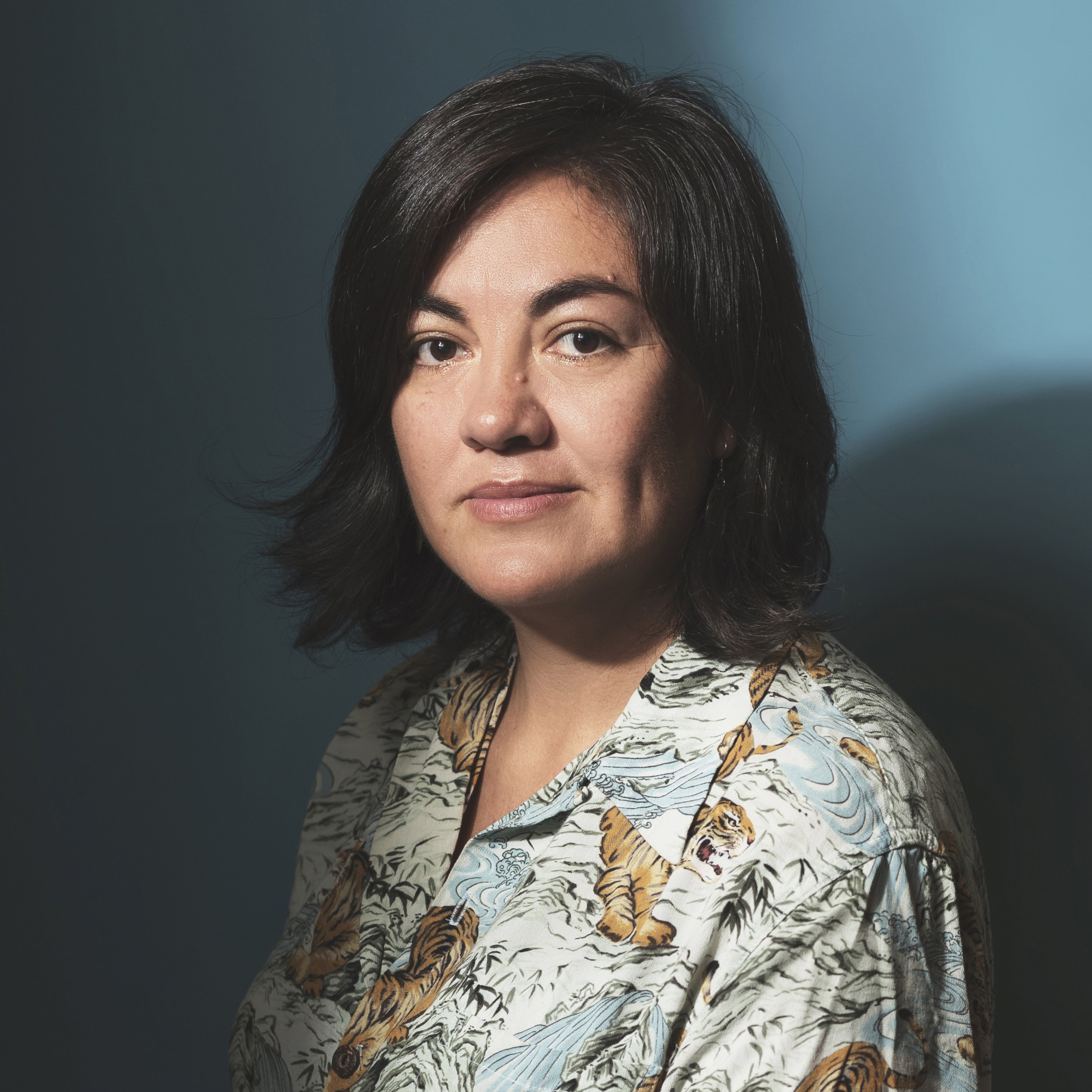Pride for Sale: Trans Women are Left Out of the LGBTQ Economy
Roxy Chávez, a trans Latina entrepreneur and owner of Roxy’s Store in South Los Angeles. Photo by Karla Gachet for palabra
For these trans entrepreneurs, survival isn’t a seasonal display — it’s a daily endeavor.
The glass storefront gleams under the decals and “Pride Sales” signs. Inside, mannequins wear slogans: Love is Love, We See You. Outside, Vanessa wipes sweat off her brow while adjusting the signage on her mobile pet grooming van, Vida Mobile Pet Grooming, the small business she and her husband built together, one paw at a time. A trans woman and former showgirl once known as “The dazzling Vanessa Antineli,” she now works nights as the cashier to make ends meet at Club Cobra, a Latino gay bar in North Hollywood. Her pride isn’t screen-printed, it moves through streets where safety flickers and hustle is resilience. “They see our image,” she says, “but not the cost of our survival.” At retail stores, she wandered the pet aisles during Pride Month, spotting rainbow collars on display. “Why not my collars,” she wonders, “the ones with ‘Vida’ on the tag? Why not the name of my business?” In the glass, she sees herself reflected, next to a glitter-covered mannequin.
Globally, the LGBTQ community holds an estimated $3.9 trillion in purchasing power, and studies show that LGBT-inclusive advertising can increase consumer intent by 40% and referrals by 66%. But several companies have retreated from reaching out to the LGBTQ community and, in some cases, have eliminated even the smallest display of acceptance, such as the iconic rainbow flag. “Of course, because we are seen as a means to monetize our gender,” says Roxy, a trans Latina entrepreneur and owner of Roxy’s Store in South Central Los Angeles.
“What strikes me is that they only use us to make money during our Pride Month.” Roxy adds that it actually becomes an economic hardship. “Because after that (Pride Month), those same pieces (clothing, keychains, flags, etc) aren't worth half of what they were being sold for. They sell off cheap, and many times I notice they'd rather sell them at a discount than donate them to the organizations or identities of our gender, so that we could have access to them for free after they've already made their profit.”
Roxy Chávez dresses mannequins for display at Roxy’s Store in South Los Angeles. The shop sells clothing, shoes, and household items, with a playful tagline: 'Roxy’s Store — where the Barbies shop.' Photo by Karla Gachet for palabra
Every stitch in Claudia Abundis’ designs is an act of reclamation, she says, a way to honor what the world keeps stealing; her shape, her image, her creativity, her dignity. The Mexico-born fashion designer behind the Los Angeles-based Rag to Fab turns overstock fabric and secondhand garments into unisex pieces that she says resist gender norms and fashion trends.
Her garments are bold, intentional, and rooted in sustainability. But even in queer spaces, real support for entrepreneurs like her is rare. “I haven't had access to any financial help.” Claudia tells palabra.
“There are no programs made specifically for trans business owners like me.” She thought the LGBTQ community would lift her up. Instead, she says she was scrambling. The business growth has been slow, not because of a lack of talent or will, but because of a lack of access to capital and connections that she believes are harder to come by for trans women. The Pride floats vanish in July, but her bills don’t.
Claudia Abundis at her workshop putting together her Rag to Fab fashion collection. Photo courtesy of Claudia Abundis
Neither Vanessa, Claudia, nor Roxy ever set out to become businesswomen. They said that they simply were left with no other choice. “I started with no capital, no credit, and at a second-hand grooming table,” Vanessa mentions. “It will survive or disappear.” It was a hard “no” when she and her partner applied for a business loan through a national financial institution. “They just said they weren't giving out loans at the moment. They never told us why, and we never asked again.” The same bank told Roxy they didn’t offer small business loans, only auto and home loans, but an online search showed otherwise.
It’s not just a gap in access; it’s a gatekeeping system dressed in polite excuses, they believe. For trans women like them, there are no startup mentors, no angel investors, no glossy branding decks, just a lot of hardship and YouTube tutorials.
Claudia built Rag to Fab, one piece at a time. “Big companies have financial resources, we don’t,” she says. “You can’t compete when buying fabric with your own money.”
Vanessa runs a pet grooming business with her partner, but still works a second job for the extra income and stability it brings.” It’s hard for a trans woman to show that she’s making it without other struggles,” Vanessa says.
Roxy survived years unhoused before saving enough to open a small store, but she was robbed and attacked there. “It’s been hard, but I’m still here after ten years.” Their stories reveal a system that leaves trans entrepreneurs without the support they need to thrive.
Roxy Chávez has run her business independently for a decade in South Los Angeles. Photo by Karla Gachet for palabra
According to a 2021 report from the Williams Institute at the UCLA School of Law, “Transgender individuals are more than four times as likely to experience violent victimization.” This ongoing threat is underlined by the Human Rights Campaign, which reported that at least 32 trans people were murdered in the U.S. in 2024. For trans business owners, this extends beyond the physical harm, manifesting in financial insecurity, digital erasure, and bureaucratic exclusion. The Trump administration has proposed laws that fail to document trans crimes and that activists say would only further marginalize the community. Before trans women can truly be seen, they face barriers even in spaces that claim to celebrate them.
Vanessa recalls paying $1,200 just to secure a spot in the West Hollywood Pride Parade two years ago. “I had to send them my story, why I deserved to march, and still, we had to pay,” she says. “It wasn’t support, just a fee.” Meanwhile, Claudia is trying to piggyback with The TransLatin@ Coalition to showcase her designs and amplify her messages, because many trans entrepreneurs don’t even know how to access these opportunities.
Claudia Abundis with her designs at her workshop. She collaborates with The TransLatin@ Coalition to showcase her designs. Photo courtesy of Claudia Abundis
LA Pride, a nonprofit celebrating 55 years, explains that partnerships are carefully selected to align with its mission. Board director Gerald Garth emphasizes that their decisions are based not only on participation in the festival and parade but also on a partner’s year-round commitment to the community. “We task our partners to explore what their support of the community looks like throughout the entire year. And those are how we make decisions on who we partner with,” he tells palabra.
Support the voices of independent journalists.
|
For many trans women, especially immigrants, access to mentorships and safe financial tools isn’t a gap, it’s a gate that they say keeps them out. Vanessa says that investing in paid ads on Yelp brought in great leads, but at a cost her small business couldn’t sustain. “It was working, but it was too expensive to keep up.”
After several unsuccessful attempts at “traditional” workplaces, Claudia turned to her craft, sewing clothes by hand, and selling pieces online. But even that’s a battleground. She contends that oftentimes her posts online are often flagged or hidden on Facebook and Instagram. Words like “trans,” “unisex,” or “body” become triggers for silence.
Marketing isn’t a strategy when you're trans, it’s a gamble, and some members of the trans community call it outright censorship, such as was the case earlier this year when Instagram was accused of doing just that by restricting “sexually suggestive” content under a “content” policy by its parent company Meta that also did away with monitoring hateful content. But if you leave social media platforms, you lose followers, you lose business, and you could lose your livelihood. It’s a huge cost the trans community is paying. It’s a form of economic violence, says Vanessa.
Roxy Chávez has sustained her business for ten years in South Los Angeles. Roxy’s Store is open year-round.. Photo by Karla Gachet for palabra
Pride isn’t a marketing campaign, it’s a survival strategy. While some companies profit from rainbows and Pride Month activities, women like Vanessa, Claudia, and Roxy are building a world that they say never made space for them. Claudia stitches resilience into every thread she sells; Vanessa invests every dollar in never guaranteed visibility; Roxy channels memory and resistance into every piece she sells.
They’re adamant in saying that they’re not waiting to be included, but that they’re creating their lanes, language, and their own legacy. The LGBTQ economy isn’t powered by the biggest logos, but by the boldest wounds. Not for sale. Not forgotten. Just undeniably, unapologetically alive.
—
Jimena Sandoval is a social communicator who studied at the Universidad Centroamericana José Simeón Cañas (UCA) in El Salvador. She is an entrepreneur and communicator known for her leadership in promoting equity and visibility for the 2SLGBTQIA+ community. As the founder of Noisy Digital, the first trans-led marketing agency, Jimena focuses on empowering marginalized communities, particularly the TGI (transgender, gender expansive, and intersex) population. She has been involved in significant initiatives alongside organizations like The TransLatin@ Coalition and Bienestar Human Services. With a strong background in PR and marketing, Jimena works to amplify the voices and stories of the LGBTQIA+ community, creating impactful change and opportunities. @jimenasv387
Karla Gachet is an Ecuadorian visual storyteller with over fifteen years of experience documenting Latin America. Her work focuses on culture, territory, indigenous rights, and environmental issues. Gachet has been published in prominent media outlets, including National Geographic Magazine, Smithsonian, and The Washington Post. Her work has been awarded in prestigious competitions such as World Press Photo, POY, and POYi Latin America. In 2023, she received a National Geographic Explorer grant to lead a group project about cumbia in Latin America. In addition to her documentary work, Gachet is an editor to other colleagues and a mentor to up-and-coming photographers. She is part of Ayün Fotógrafas, a collective of women visual storytellers connected to Latin America. For the past 9 years, she has documented Latinx and Native American communities in the United States. @kchete77
Patricia Guadalupe, raised in Puerto Rico, is a bilingual multimedia journalist based in Washington, D.C., and is the interim managing editor of palabra. She has been covering the capital for both English- and Spanish-language media outlets since the mid-1990s and previously worked as a reporter in New York City. She’s been an editor at Hispanic Link News Service, a reporter at WTOP Radio (CBS Washington affiliate), a contributing reporter for CBS Radio network, and has written for NBC News.com and Latino Magazine, among others. She is a graduate of Michigan State University and has a Master’s degree from the Graduate School of Political Management at George Washington University. She is the former president of the Washington, D.C., chapter of NAHJ and is an adjunct professor at American University in the nation’s capital and the Washington semester program of Florida International University. @PatriciagDC












